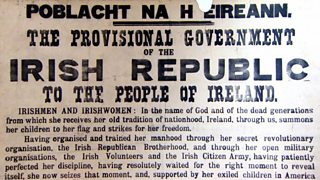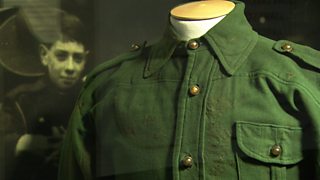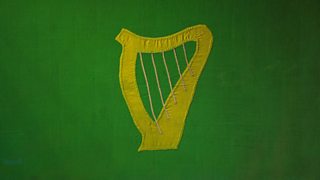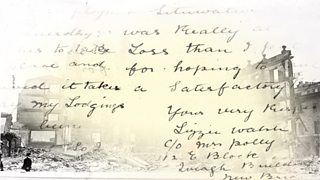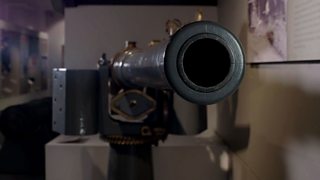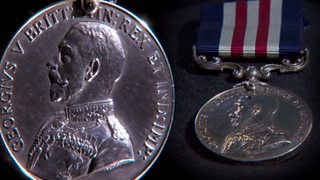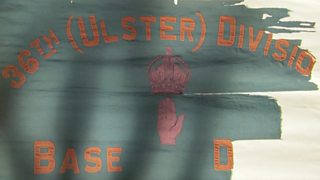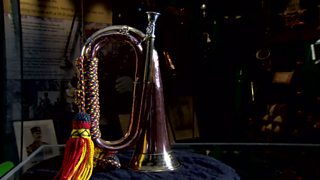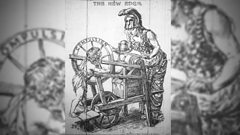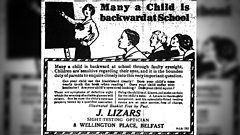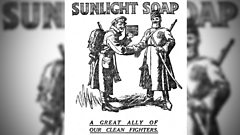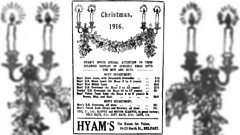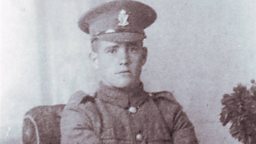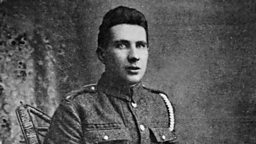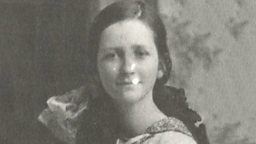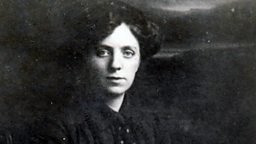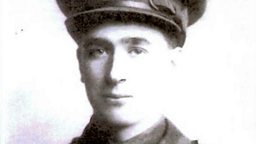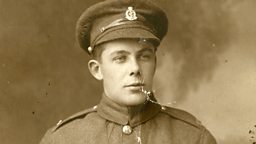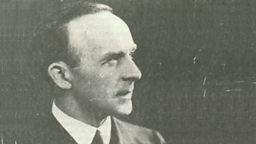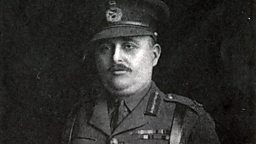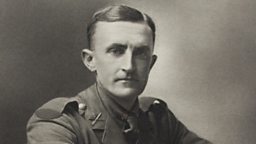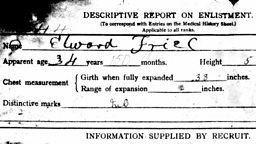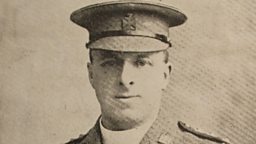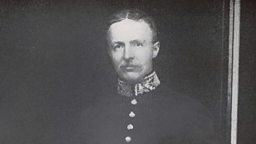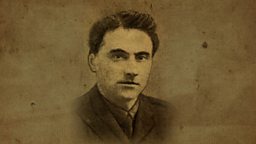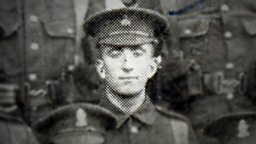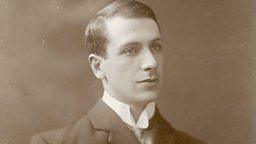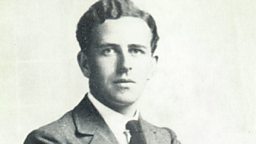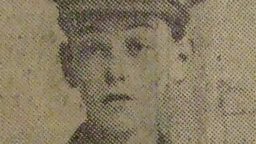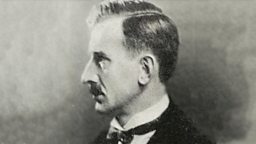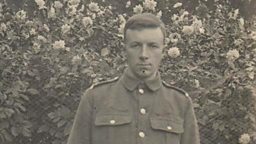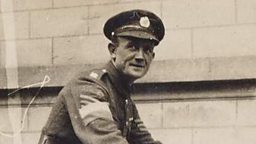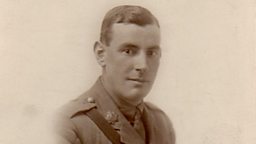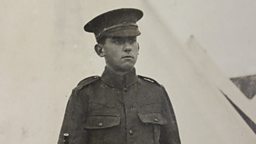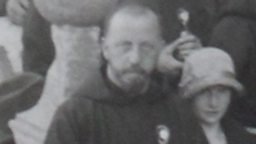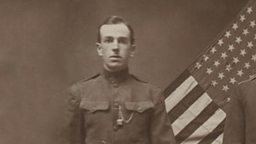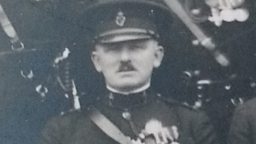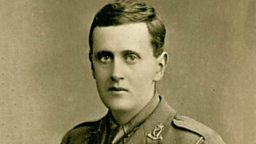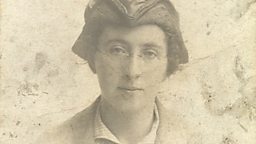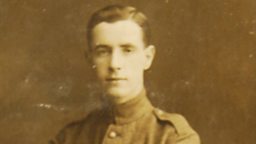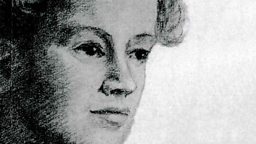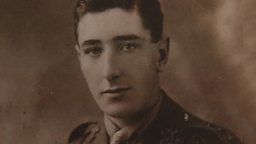A A Dickson
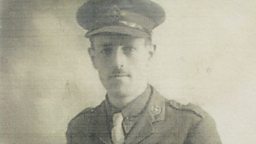
Ordered to execute
In 1916, Archibald Annan Dickson – a newly-commissioned British soldier in the Sherwood Foresters – saw his first and unexpected army service as a Second Lieutenant at the Easter Rising.
The thirteen rifles went off...
Suddenly rushed to Dublin, he says he found himself plunged straight into the fierce fighting in the Battle of Mount Street. Then, at the time of the surrenders, Dickson recalls being sent to escort the Countesses Markievicz and Plunkett through the streets of Dublin. And after the court martials of the leaders of the Easter Rising, Dickson says he was ordered to command one of the Kilmainham firing squads at the executions.
Later, he went on to serve on the Western Front, being wounded at Gommecourt.
Years later, Dickson described his experiences at Easter 1916 as having been "a horrible time of street fighting". He recalled the duty of the firing squad as being "another job that had to be done", and also as a hateful one. Dickson would go on to become a lifelong member of the pacifist organisation, the Peace Pledge Union.
Joining up
Archibald Annan Dickson was born in 1894, in Devon. Of his life before army service, AA Dickson wrote that he had been: "...at Lloyds Bank at Holsworthy (now Devon) where we had a sub-office at Bude run by a firm of solicitors."
Deciding to join the army, he was taken into the Inns of Court Officer Training Corps, he says, which he thought "were all sorts ... found a lot of good friends ... including Hawkin".
Sherwood Foresters
Dickson subsequently joined the 2/7th Sherwood Foresters (Nottinghamshire and Derbyshire Regiment) as a Second Lieutenant:
"We all went into whatever regiment happened to need more recruits. And I only went into the Sherwood Foresters because they happened to be near where I was training in the OTC at Berkhamsted and they sent over that they needed three officers."
He would later recall that Hawkin was commissioned on the same day as him.
Easter Week 1916
Sudden order
After three months training, Dickson says "... we got a sudden entrainment order and were rushed to Liverpool Docks. There it became known that we were bound for Dublin to deal with a Sinn Fein rebellion. We landed next morning at Kingstown (now called, though not spelt, Dunleary) and marched on Dublin by way of the southern suburbs. On the way we passed a house where our Adjutant's wife and children had come to stay for a holiday. He was killed a few hours later."
Battle of Mount Street
As they neared Dublin, Dickson recorded that they were plunged straight into action. Hearing firing ahead, he says their C Company "came under fire near Ballsbridge from houses commanding our approach-route."
Then, "I was sent forward from D Company ... shots came from a house in the road-fork just ahead; B Company ... kept up covering fire on the house while I broke in with a few bayonet-men but the rebels left by the back way."
"On returning w[ith] D Company I heard that my friend Hawkin had been killed in attacking a house ... that house was blown in with bombs and the rebels gradually gave back from house to house as we advanced by rushes with some cover from trees along the kerbs, with bullets of all sorts chipping pavements and gate-posts; one chipped the bark one side of a tree as I left it."
Dickson believed he was lucky to escape the fighting alive:
"Another [bullet] must have ricocheted off the pavement and struck end on into my Field Service Pocket Book in a side pocket but I never noticed it till afterwards ... D Company and the remains of A and B worked forward under heavy fire up Mount Street towards a canal bridge, clearing houses en route ..."
Mount Street losses
The soldiers, Dickson says, finally saw the fierce fighting abate:
"We had to bomb a school building that the rebels were holding ... A tall house beyond the bridge was commanding our fourth advance; it was rushed by Foster, senior subaltern of D Company; their bombs set the gas alight ... and burned the house out. Opposition died down after that ..."
Then, the Sherwoods assesd their heavy losses: "... got most of D and C Companies together by the canal, C having lost all their officers ... the Staffords were sent to relieve us and we ... slept on the pavements in relays off-duty."
Mount Street: Narrow escape
After his first days' army service, Dickson undertook to write to his friend Hawkin's family, to tell them of his death in Dublin:
"We were paraded for congratulation by Genl. Sir John Maxwell on our work - our first active service - in the difficult art of street fighting. Then in my first free time, I set to work to write to Hawkins's people in London ..."
He himself would write later to "my own sweetheart", Jessy, from Dublin, reflecting on his own experience, and his relief at his survival:
"I must ... show you among other things the hole in my pocket where a bullet went in, and the bullet itself stuck in my Field Service Pocket Book ... That was one of the narrow escapes I had in the first days fighting that we have to be thankful for ..."
Clearing up resistance
Dickson was subsequently detailed to escort a batch of captured rebels to Knutsford Gaol in Cheshire, "taking every precaution en route to keep them in and keep enquiring people away."
On arrival, "we handed over our correct number..." and Dickson says he finds the Governor's young nephew "all agog to talk to someone 'straight from the fighting'."
Then, says Dickson, "we had to take our men back ... to make the best of our way, battered-looking and weary enough to be cheered as we trudge through Chester ..."
On Dickson's return, "we circled round the suburbs of Dublin, clearing up odd patches of resistance, still sleeping where we could ... for a week or so, and then were accommodated in Richmond Barracks where a military court was trying the principal prisoners."
There, he "... had to do most of the daily inspections of the prisoners' quarters (crowded into barrack rooms) as, the only other subaltern in D had been detailed as a messenger for the court."
Escort to Countess Markievicz
The young soldier was next given the task, he says, of escorting Countess Markievicz and Countess Plunkett to a nearby prison, Markievicz having played a high-profile part in the Easter Rising:
"I had to escort two important lady prisoners - Countess Plunkett and the celebrated Countess Markievitsch [sic] - to another prison. There was confusion as to how they were to be taken there: apparently they refused to go in a cab with any soldiers, and the army would not risk them in a cab unaccompanied for fear of escape. Eventually they agreed to walk under escort."
"Accordingly very early one morning ... these two dignified and determined ladies were committed to my charge and set out walking stoically along the middle of the dingy streets, with half-a-dozen soldiers in file keeping pace with them on each pavement ... Their stately deliberate pace was slow march for us, but my enquiries as to whether this rate of progress suited them were acknowledged only by a silent bow of the head. No incidents interrupted us and they were ... handed over to their fresh custodians."
Executions
After the Easter Rising, Dickson remained in Dublin. Then, he says, a number of subalterns, including himself, a Second Lieutenant, received new orders:
"The court-martial at Richmond Barracks sentenced many of the rebels to imprisonment and a number of the leaders to death. One evening five subalterns were ordered to command firing parties to shoot five of them ... the following dawn. A kindly but strict old Major of one of the Battalions gave detailed instructions to each of us ..."
Dickson describes how arrangements were made in a way as to ensure "no man knew whether his rifle had been loaded with blank or with ball; each was thus left not knowing whether he personally had shot the man or not."
Dickson then details how events unfolded, with the men marching their squads "... long before dawn in a dismal drizzle, but the men with memories of our losses seemed to have no qualms as to doing the job: 'Pity to dirty all these rifles; why can't we do him in with a bit of bayonet practice?"
"We had to wait while it grew fairly light and I took the chance to instruct the squad exactly what orders they would get. I didn’t want any muddle about getting them back around that wall. 'After Ready', I told them, 'on the word 'Present'', you bring your rifles smartly up to the standing-arm position aiming at the piece of white paper pinned on his chest and on the word 'Fire' steady pressure on the trigger, just like on the range ..."
"Thanks to that preparation it was carried out smoothly. The thirteen rifles went off ... The rebel dropped to the ground like an empty sack ... They marched in perfect order round that wall, grounded arms ..." Dickson noted, "Remember, we had all lost some good pals, in our first day's active service."
Dickson says that afterwards: "I can't say I felt much except that it was just another job that had to be done; though I was glad there was no doubt the rifles had done their work and there was no need for me to do what that old Major had told me, about the officer going back and finishing the job off with his revolver."
Elsewhere, however, he would describe this duty as having been a hateful one.
After the Rising
Still in Dublin
After the Rising, Dickson was initially required to stay on in Dublin, "going out when trouble was reported ..."
Thereafter, he was sent to the west of Ireland, and heard for the first time of what was happening at the Somme: "... when the rebellion was over, we were sent to continue training, and at the same time be ready to keep Ireland quiet over in the west near Galway. And it was while we were there that we got news of this Somme attack and so many men we knew who were simply going west by the hundred ..."
Dickson spent "the summer under canvas, training hard and feeding well, with few alarms."
But he says, "all the time we were wondering when we would even get to France, all the time news kept coming of people we had known going West and we were sick of playing soldiers at home ..."
Serving on the Western Front
Dickson found his "hopes of going to France" finally realised when he was sent to serve on the Western Front at the end of 1916: "... and we went out to France, on a lower part of the Somme front ..."
Dickson says "all through 1917 we were pushing on ..." He was promoted to Lieutenant, and later, Captain, in command of a Light Trench Mortar Battery.
In 1918 Dickson was shot at Gommecourt by a sniper. Sent home to recuperate, he survived the war.
Pacifist
Dickson became a longstanding member of the Peace Pledge Union, this having as its pledge: "I renounce war and I will never support or sanction another."
He died in 1979.
These pages are based on personal testimonies and contemporaneous accounts. They reflect how people saw things at that time and are not meant to be a definitive history of the period.
Voices 16 objects
Voices 16 galleries
Credits
A A Dickson's recollections come from his written and recorded testimonies held at the Imperial War Museum, as does his image. All used here by kind permission of his family.
